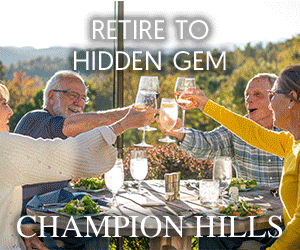 By Stuart Hall
By Stuart Hall
Dan Brooks arrived at Duke University in 1984 as a young coach taking over a 10-year-old program and knowing only one way to recruit. While the women’s golf landscape has evolved over the last 30 years, Brooks’ recruiting philosophy has not.
Considering he is collegiate women’s golf’s winningest coach and has led the Blue Devils to five National Championships and 17 ACC Championships, arguing against his approach is nonsensical.
Brooks will tell you he’s “going for great kids and great players,” but that comes across as a coaching cliché because what successful coach would want otherwise? Talk recruiting a little longer and he reveals a real gem.
“I’ve been border blind for so long, I guess I don’t know any other way to be honest,” he says.
What exactly “border blind” means is best reflected in this year’s Blue Devils roster. Of the eight players, six list their hometowns as being outside the United States — Yu Liu and Yi Xiao (China), Irene Jung (Canada), Alejandra Cangrejo (Colombia), Celine Boutier (France) and Laetitia Beck (Israel). Esther Lee and Sandy Choi claim Southern California as home, but also have Korean backgrounds.
Such diversity is becoming commonplace at Duke and other programs throughout the country. Rosters mirror the growing global scope of the women’s game at the professional ranks. A glance at the Feb. 24 Rolex Rankings — the world rankings system for women’s professional golf — shows seven nationalities represented among the top 10 players.
Under Brooks, Duke has had 16 letter winners who claimed an international hometown. Jackie Orley (1984-87), of Kurnact, Switzerland, was Duke’s first international player. A year after arriving in Durham, Orley was joined by sister Evelyn.
The Orleys were more the exception at the time.
“The change is that there are way more kids interested in coming and playing golf and going to college. That’s the difference,” Brooks said. “So when I pull up [American Junior Golf Association] and PGA Junior Series results, I’m seeing kids from all over the place. It’s a broader landscape from which to recruit.”
During Brooks’ tenure only once has he left the United States to recruit an international player, and that was last summer when he attended an international competition in Sweden to watch a potential recruit. Then there is Xiao, a sophomore, whom Brooks never saw play in person before arriving at Duke.
“She was actually recommended to us,” Brooks said. “I saw videos of her swing, but she did not play in the U.S. where I could see her play. She is an exception. I wouldn’t normally recruit somebody without seeing them play.”
When Brooks scours the junior golf landscape initially what he is most interested in is low scores on long courses against the best talent. From there it becomes less metric and more personal, he is concerned with “if they’re coming across to me as great kids and they know what they want and they seem to know what hard work is,” he said.
“It’s not like I’m going out to find a foreigner because they’re more grown up and they do things later, I’m just responding to what I see.”
By grown up, Brooks is referencing more of an international culture.
“They have traveled from country-to-country-to-country to play in tournaments, so that tends to grow you up a bit,” he said. “So you’re traveling, you’re doing more adult things on your own, and then you’re also a little bit older because you haven’t tried to get recruited at an extremely young age. You’ve waited a little longer. So for a few reasons we are dealing with kids who maybe know themselves and know what they want a little better.”
But again, Brooks is border blind.
Duke’s 2002 national championship squad featured just one American, Leigh Anne Hardin. Cangrejo, a senior, remembers her freshman season.
“When I was a freshman there were only six [players] and four were American,” she said. “So I had to get used to being part of an American team. But then it started becoming more diverse with all of these different cultures.”
Assimilating the various cultures can make for unique chemistry, but it’s become a part of the Blue Devils’ everyday life. Based on Fall 2013 enrollment statistics, 9 percent of the university’s 6,495 undergraduate students are categorized as being foreign. Forty-nine percent of the students are categorized as Caucasian, followed by Asian-American (21 percent), African-American (10) and Hispanic (6). Only 15 percent are listed as North Carolina residents.
“If you walk down the sidewalk here at Duke, you see so much diversity that they feel pretty much at home,” Brooks said.
Duke assistant coach Jeanne Cho, who was born in France to Korean parents, agrees. She was a four-year starter at the University of Florida and played professionally for six years.
“Florida is a very big school and has a very strong American culture, so it was a big adjustment for me,” Cho said. “If I had to compare my experience at Florida with what the girls are experiencing here at Duke, it’s a completely different setting. Duke is small, the student body is very international and it’s very diverse.
“The different cultures are the part that makes this team very interesting. Just knowing that everyone has moved from far away to come to Duke, they share that and it just brings them together even more. Their families are so far away, so this is their family here and it definitely sped up the bonding experience because they didn’t have anyone really to rely on here.”
Cho also speaks French, Spanish and Korean fluently, which helps bridge the gap with the players — “Celine likes to gravitate toward French when we’re one-on-one,” she said — and especially their parents.
Brooks believes the players’ different nationalities, especially the Europeans, form a team bond a bit faster because many have played on highly competitive national teams.
“We’ve got players in the U.S. who are on high school teams, but that national team experience, it’s a real bonding,” Brooks said. “I’ve seen how strongly they pull for each other. They’ll finish their match and go right back out on the course and watch their teammates play. They know a whole lot about being on teams, and conversely you can recruit somebody from America who is home schooled and doesn’t know anything about being on a team.”
The players’ varied backgrounds can make for lively times around the Blue Devils’ dining table. While a number of players prefer Asian cuisine, Boutier likes her native French, Cangrejo admits to not being too “adventurous,” and Beck has dietary restrictions due to her Jewish faith. As well, dinner conversations can run the gamut.
“Coach [Brooks] likes to have political discussions, but we have a lot of conversations that are about any number of topics,” Cangrejo said. “We are all making comments that are reflective of our individual backgrounds or cultures, so it can be very interesting. [My teammates] open my eyes to a lot of things.”
That is what happens when people are border blind.
















